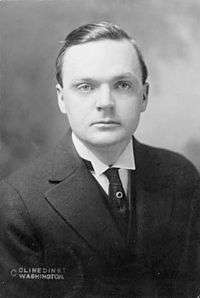Dudley Field Malone

Dudley Field Malone (3 June 1882 – 5 October 1950) was an American attorney, politician, liberal activist, and actor. Malone is best remembered as one of the most prominent liberal attorneys in the United States during the decade of the 1920s and for his unsuccessful 1920 campaign for Governor of New York.
Biography
Early years
He was the son of William C. Malone of New York City, a Tammany Hall Democratic official, and Rose (née McKenny) Malone. He graduated from the College of St. Francis Xavier in 1903 and studied law at Fordham University. He became a lawyer, and also became active in the Democratic Party in New York, in the reform faction opposed to the Tammany Hall organization. In 1912, he helped organize Woodrow Wilson's successful primary and general election campaign for President.
Political career

When Wilson took office in 1913, he rewarded Malone by appointing him Third Assistant Secretary of State. Later in 1913, Wilson appointed him Collector of the Port of New York, an important patronage position. As Collector, Malone resisted all efforts by Tammany to use the Collector's office for patronage. He served as Collector until 1917, when he resigned.
Malone broke decisively with the Wilson administration in the Fall of 1917, publicly endorsing anti-war Socialist Morris Hillquit for Mayor of New York.[1] Although not a member of the Socialist Party of America himself, Malone found Hillquit's call for an expeditious end to the European war to be compelling, writing in an open letter to Hillquit:
"You, as I understand it, advocate no separate peace for America, but the quickest possible peace that can be negotiated in the interests of the masses of all nations, with no annexations and no punitive indemnities. If this be Socialism, it is also sound Catholicism, Protestantism, Judaism and Americanism."[1]
Malone had become an advocate of women's suffrage, and resigned to protest Wilson's failure to take up that issue or support a Woman Suffrage Amendment to the Constitution. In 1918, he won the release of a group of suffragettes who had been jailed for anti-Wilson "silent sentinel" demonstrations led by Alice Paul. Malone successfully appealed their convictions for "unlawful assembly" for "obstructing the sidewalk" in front of the White House.[2]
In 1920, Malone ran for Governor of New York as the candidate of the newly organized Farmer-Labor Party. In the 1920 election, he got only 69,908 votes out of over 2.8 million cast. From 1920 on, he devoted himself to his law practice, specializing in international divorce cases of wealthy individuals. He established a branch office in Paris.
Later legal career
In 1925, Malone was invited to join Clarence Darrow as co-counsel for the defense of John T. Scopes in the famous "Monkey Trial". In response to Bryan's argument against admitting scientific testimony, Malone gave arguably the best speech of the trial in defense of academic freedom. "I have never learned anything from any man who agreed with me," was one of his famous quotes.
Malone continued his divorce practice until the 1930s, when he moved to California. He served as counsel to 20th Century Fox, and appeared in a few movies as a character actor. As Malone bore a strong resemblance to Winston Churchill, he was called on to play Churchill in the film adaptation of Joseph E. Davies's book Mission to Moscow (1943).
Personal life
In 1908, he married May Patricia O'Gorman, daughter of Judge and U.S. Senator James Aloysius O'Gorman. Mrs. Malone divorced him in 1921 in Paris.
In 1921, he married writer and suffragette activist Doris Stevens.
In 1930, he married Edna Louise Johnson.
References
- 1 2 "Malone Backs Hillquit and Socialism," New York Tribune, vol. 77, whole no. 25,913 (October 27, 1917), pg. 16.
- ↑ Hunter v. District of Columbia, 47 App.D.C. 406, 1918 WL 18180 (1918)
External links
- Dudley Field Malone at the Internet Movie Database
- Tribute to Lajpat Rai by Dudley Field Malone in the South Asian American Digital Archive (SAADA)
| Wikimedia Commons has media related to Dudley Field Malone. |
| Wikiquote has quotations related to: Dudley Field Malone |
| Government offices | ||
|---|---|---|
| Preceded by Chandler Hale |
Third Assistant Secretary of State 1913 |
Succeeded by William Phillips |